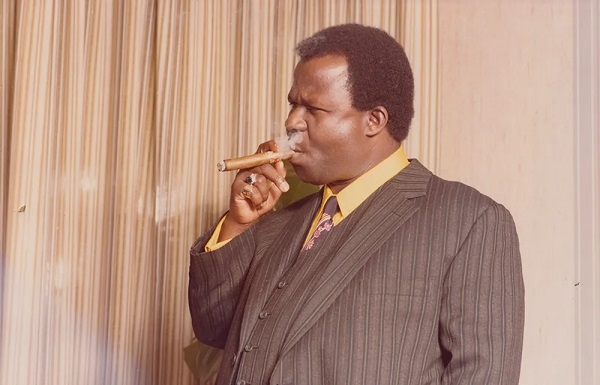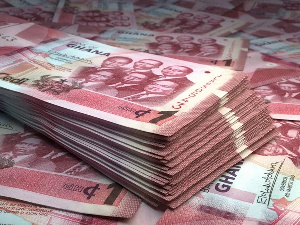The Billion-Dollar Bluff: How John Ackah Blay-Miezah scammed investors worldwide in the 1970s

It is no secret that for any elaborate scam to take place, it must first be well conducted, believable and must achieve its intended purpose, which often ends with loss, pain, anger and even denial on the part of victims.
For John Ackah Blay-Miezah, his illegal schemes were so elaborate that it gained international attention after he was involved in swindling high-profile personalities, including presidents, businessmen, politicians and regular everyday people.
According to excerpts of a book authored by Yepoka Yeebo and titled; ANANSI’S GOLD: ‘The Man Who Looted the West, Outfoxed Washington, and Swindled the World’, Blay-Miezah’s story is said to have taken place in the 1970s, when Ghana was faced with an unprecedented economic crisis, with inflation pegged at a whopping 117 percent.
Production of the country’s key export commodity; cocoa, had plunged severely, leaving the country’s foreign reserves in near tatters, while citizens were stuck in a post-dictatorship rollercoaster.
While all this took place, there came out of nowhere a ‘false magician’ in the person of John Ackah Blay-Miezah, who depicted flamboyance of wealth, connections, and deep pockets, a notable theme adopted by most scammers.
He posed as an affluent businessman seeking to offer grand riches to persons who bought into his cautionary tales.
Despite the varied accounts of his schemes, the most notable, according to freelance journalist Anakwa Dwamena, who took some of his inspiration from Yepoka Yeebo’s book, publishing a review in the New York Times, said that in 1972, Blay alleged that Ghana’s first president, Dr. Kwame Nkrumah, had revealed something grand on his deathbed.
He indicated that Blay-Miezah claimed that Nkrumah said he had hidden tens of thousands of gold bars and huge sums of cash amounting to untold millions in the vaults of Swiss accounts.
He claimed that the vault was set up in a Trust and could only be accessed by Nkrumah’s close confidant, who happens to be he himself [John Ackah Blay-Miezah]. He told investors that to gain access to the funds, conditions of the Trust had to be met.
Blay-Miezah told his investors [victims] that the funds would then be released by Swiss authorities with the bulk going towards the development of Ghana while the rest would go to him [Blay-Miezah] and his investors, who were eager to cash in.
The narrative he pushed seemed rather odd, and suspicions arose as to whether Blay-Miezah’s tale had an iota of truth even after many years on.
As a young boy growing up in a coastal village, Blay-Miezah developed and sharpened his ability to read people at a very tender age. There, he would learn how to tell elaborate lies and orchestrate plots while scheming his way into becoming a petty thief.
After one of his botched operations, he was imprisoned on petty theft charges but this would lead him to his next stage of the ‘scam ladder’.
While in jail, he was in cells with certain powerful elites who had fallen out of favour with successive regimes at the time.
These elites, according to the book review by Anakwa Dwamena, provided the stage for Blay-Miezah to learn “how a powerful man should sit, how he should nod his head, how he should take up space in a room.”
In the same confined space, he met a radical chaplain, from whom Blay-Miezah stole his language by learning how to speak boldly, with affluence.
Yepoka Yeebo’s book, however, details that years on, Blay-Miezah and his partners “were selling liberation: a chance to repair the wounds of colonialism. To everyone else, they were selling the chance to loot an African country’s ancestral wealth.”
After serving his time in prison, he was intentioned to remain on good terms with the political regime in power. He then embarked on the quest to acquire a diplomatic passport to convince his investors that he had exclusive access to the funds [Nkrumah’s supposed Trust in the Swiss vault].
His schemes became so grand that he was wanted for fraud in Liberia as well as being trailed by U.S security operatives.
“He’s full of lies,” a former Ghanaian diplomat said to U.S. prosecutors.
Not only were his investment schemes fake, but they were elaborate to the extent that his American victims considered it as speculative investment, while others came to terms that their returns would rather take years to yield any results.
Blay-Miezah, who was fond of wearing tailored suits and smoked cigars, drove a white Rolls-Royce and was often accompanied by a team of security personnel who were said to be former special forces soldiers.
Over a 15-year period, Blay-Miezah conducted these fake schemes, scamming many people amounting to millions. His American partner, for instance, is said to have scammed at least 300 people for a total of $15 million.
He became wanted so much that one of his investors embarked on a mission to Accra where he tried to personally choke Blay-Miezah to death in hopes of securing his investment back.
When reality finally caught up with him, Blay-Miezah was indicted on several counts of wire fraud in the USA. The government of Ghana at the time, seemed willing to extradite him but he escaped again from a prison in Pennsylvania.
John Ackah Blay-Miezah died in 1992 while under house arrest for deceiving and embarrassing the government and even in death, he caused one final confusion among his own family members by convincing them that he had a non-existent $15 billion sitting in a bank abroad.
This story was first published by GhanaWeb on August 5, 2023
Source: www.ghanaweb.com





